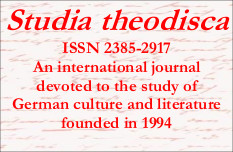«Es klingt paradox». Hölderlin, Böhlendorff e il teatro moderno
DOI:
https://doi.org/10.13130/1593-2478/8062Abstract
The paper discusses Hölderlin’s “first letter” to Casimir Ulrich Böhlendorff (December 4th, 1801) in two steps. First, textual and contextual elements are presented, so as to draw attention to the intellectual network in which the epistolary dialogue as “psyche among friends” is settled (1). A thorough, close reading of the letter is then given, focusing on both argumentative macro-structures and micro-analytical issues (2); a closing paragraph briefly looks at the implications of the case study for a better insight into Hölderlin’s late translating/rewriting and commenting of Sophocles. The main claim of the paper is that the poet’s well-known moving away from neoclassicist normative aesthetics towards an original, “paradoxical” solution of the ancient-modern-question (Überwindung des Klassizismus, Szondi) is consistently linked to the epistolary frame in which the alleged theoretical digression is inserted, i.e. Hölderlin’s reading of Böhlendorff’s drama Fernando, his understanding of the mutual experimental work on a modern tragedy as a “free use of the proper”, and the poet’s concern about his crucial decision to leave Germany.Downloads
Published
Issue
Section
License
This journal allows the author(s) to hold the copyright without restrictions.
This journal allows the author(s) to retain publishing rights without restrictions.







